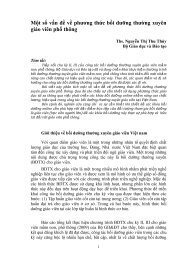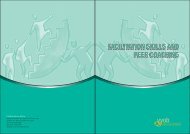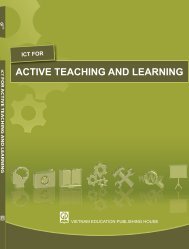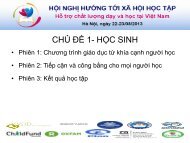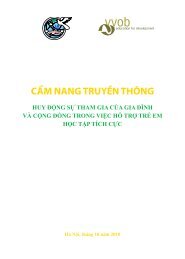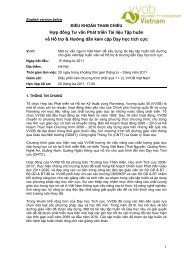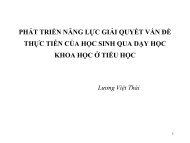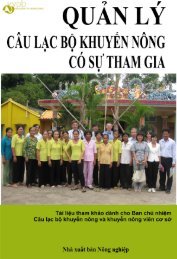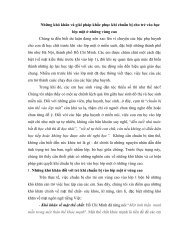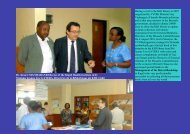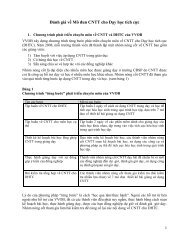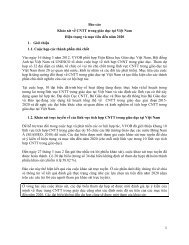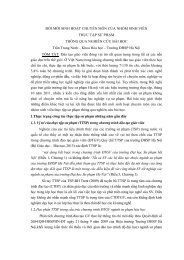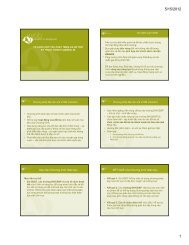Kenya Multi-Year Programme 2011-2013 - VVOB
Kenya Multi-Year Programme 2011-2013 - VVOB
Kenya Multi-Year Programme 2011-2013 - VVOB
- No tags were found...
Create successful ePaper yourself
Turn your PDF publications into a flip-book with our unique Google optimized e-Paper software.
(IR 2 and IR 3) where Healthy Learning is not directly active as a programme (top-down approach).Processes and experiences are well researched, documented and shared, external with partners andstakeholders (IR 4) as well as internal within <strong>VVOB</strong> (IR 5), which will also give opportunities forcontinuous improvement of the programme.We also refer to the Logical Framework, attached in Chapter 7.3b and Chapter 6.4.2.4, above, for forfurther details6.4.3.8. Exit-strategies and points of attention concerning sustainabilityRather than a national roll-out of Healthy Learning as a separate programme, experiences andlessons learned from the Healthy Learning programme at all levels (national, district and school level)will be further integrated into strategies as well as other large-scale programmes managed by MOE(such as home-grown school meals and school-based health interventions).Past experiences have shown that the key to the success, scale up and sustainability of health,nutrition, food, agricultural and environmental education programmes is the development of amultisectoral understanding, especially between the education, agriculture and health sectors. HealthyLearning builds on this approach in <strong>Kenya</strong> by strengthening the links between the Ministry ofEducation and other agencies and stakeholders involved in this. Currently, the Government of <strong>Kenya</strong>is developing a National Strategy on School Health, Nutrition and Meals that would provide a commonframework for collaboration and coordination across the different stakeholders involved. <strong>VVOB</strong> isalready fully involved in this process which provides an opportunity to integrate lessons learned fromHealthy Learning into the strategy.In terms of sustainability, the Healthy Learning programme also will put special emphasis on capacitystrenghtening of MOE to deliver different programme support and management functions, such asdesign, advocacy, and monitoring and evaluation (M&E). This will include capacity strenghtening ofrelevant MOE staff to do costings, prepare budgets, develop and write proposals, approach newpartners (e.g. through Public-Private Partnerships - PPPs), and fundraise.Closer collaboration with other units within the MOE will also create a wider uptake and sustainabilityof the Healthy Learning approach, e.g. the Healthy Learning programme will work with the SchoolInfrastructure Unit in reinforcing educational components of tree planting and safe water and sanitationinterventions, and with in-service teacher training to reach more schools with Healthy Learningmessages.The Healthy Learning programme will also continue to share experiences and lessons learned to moreschools through publications such as the Young African Express, an educational magazine forschoolchildren in East Africa focusing on health, nutrition, agriculture, environment and business skills.At the district level, Healthy Learning will strengthen capacity in monitoring and evaluation,coordination and resoure mobilization of MOE Officers in partnership with other stakeholders. TheDistrict School Health Coordination Committees established through the new National School HealthPolicy and Guidelines (2009) will provide increased opportunities to support this process.At the school level, continued capacity strengthening of teachers will ensure the infusion of HealthyLearning projects in teaching and learning activities. Communities are also closely involved to ensuresustainability of the interventions. Community level stakeholders actually play a strong role in theHealthy Learning programme, and this will be further encouraged and strengthened. In particular, theSchool Management Committees (SMC), led by the head teacher, manage the programme at schoollevel. The SMC administers and manages, at the school level, all facets of programmeimplementation, including procurement and reporting. Parents represented by the committees areresponsible for overseeing general management of the programme, which includes makingprocurement and management decisions. Parents of children benefitting from Healthy Learninggenerally provide cash or in-kind contributions to support school level expenditures.Lessons learned from the 30 Healthy Learning model schools and 8 Healthy Learning model districtsinform and will feed into national strategies and work plans through a bottom-up approach.<strong>Kenya</strong> - <strong>Multi</strong>-<strong>Year</strong> <strong>Programme</strong> <strong>2011</strong>-<strong>2013</strong> 65/148



